Day One of AAFCO Annual Meeting August 2019 and I’ve already got steam coming out my ears!
It’s a packed house, with 478 in attendance from 46 states and six countries. MANY are state and federal regulatory officials. There seemed to be more small pet food company representatives in attendance than at past meetings – a testament to the number of new companies coming online almost daily. The company with the most representatives: Nestle’ Purina. I counted at least twelve (including Merrick, which is owned by Purina). There seemed to be less representatives from renderer’s associations and food waste product companies (are we making any headway?).
Since the meeting is in Kentucky, we were treated to a talk regarding agricultural industry in the state of Kentucky. The good news: Kentucky has the most acreage in the United States in hemp production! The University of Kentucky is performing testing on the hemp products, including percentage of THC and contaminants in various products. Finally – research! It was reported that CBD oil processing is a $90 million industry in Kentucky alone. Other good news: Kentucky has also seen a five-fold increase in the Bourbon industry in the past five years due to production of good grains, clean water, and oak for the barrels for aging. The James Beam corporation gave five million dollars in funding for research on Bourbon at the University. (Okay, this might not pertain to pets, but pet owners might be excited!)
Following the welcome remarks from Kentucky, Dr. Steven Soloman (CVM, MPH), current director of the CVM (veterinary division of FDA) gave the keynote. He described the CVM mission statement as “Protecting human and animal health” because both are intertwined: research on animal or human medications may translate between species. There is a fairly new health directive called “One Health” which looks at global health across all species, rather than each species individually. From the CDC website:
One Health recognizes that the health of people is connected to the health of animals and the environment. It is a collaborative, multisectoral, and transdisciplinary approach—working at the local, regional, national, and global levels—with the goal of achieving optimal health outcomes recognizing the interconnection between people, animals, plants, and their shared environment.
A One Health approach is important because 6 out of every 10 infectious diseases in humans are spread from animals.
This is really good news for all of us, but as we know…we have a long way to go.
Just as I was thinking this is all pretty mundane stuff, my ears perked up when I heard Dr. Solomon speak about the “jerky treat problem” that has plagued our pets for over a decade. Dogs and cats have died or developed kidney failure secondary to eating jerky treats – mainly chicken, but also duck, sweet potato, and dried fruits. Thousands of animals were affected, many hundreds died. To date, the FDA has been unable to determine the ingredient causing death or disease.
What Dr. Solomon said next made my eyes turn red: “FDA considers the jerky treat problem resolved, even though it is not solved.” The number of reports of kidney disease and death have dropped by 95% (mind you, they have not disappeared!), so FDA is no longer investigating and the problem continues. My take on why the number of reports has dropped? Pet owners have gotten smarter! Bloggers and veterinarians have warned pet owners away from feeding these treats. They are still AVAILABLE everywhere! FDA has not pulled them or banned them. And now they are no longer investigating them. Our pets are once again left unprotected.
It’s up to YOU – the consumer – to protect your pets. Pay attention to recalls. Pay attention to Susan Thixton at www.truthaboutpetfood.com. She has her finger on the pulse of the industry. I will continue to post recalls and information when I get it.
Please continue to educate your friends and colleagues. Spread the word on healthy treat options. We have to keep fighting for our pets’ lives.
(Photo Credit USA Today)
Disclaimer: This content is for informational purposes only and is not meant to diagnose, treat, or replace consulting a primary veterinarian for individualized care.

